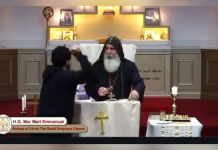Among the many documents attached to the recent IICSA hearings was an email correspondence dating back to 2015 between a survivors’ group and the Archbishop of Canterbury. I would not have picked up on this exchange but for an alarming article last Friday in the Church of England Newspaper by Sheik Muhammad Al-Husseini. Al-Husseini has core status in the IICSA hearings and although he is not directly involved in the Anglican side of the hearings, he seems remarkably well-informed about the detail of what is going on in our church. He has also spoken to several survivors and their lawyers.
The correspondence, to which Al-Husseini refers, mentions that in 2015 one of the things that survivors were complaining about to the Archbishop was the use by some dioceses of a particular company to protect their interests, Luther Pendragon, a specialist in crisis management. Without knowing anything further about this firm, one is immediately concerned to discover that at least two dioceses are spending considerable sums of money on this kind of advice. If any institution brings in professional help to protect its interests then it means that this institution has decided that it needs to ‘circle the wagons’ to protect itself against a perceived enemy. Who is this enemy? The enemy is evidently none other than the survivors themselves. These are the same people, whose interests the Archbishop of Canterbury has promised to put right at the centre of the Church’s concerns.
The letter addressed to the Archbishop on the 12 June 2015 claims that ‘scandal management companies like Luther Pendragon Limited .. are known to have acted to obstruct, apply pressure and threaten survivors, whistleblowers and others who have spoken out about Anglican clergy abuse’. Even without reading the letter detailing the techniques used by this firm, we seem to be entering a very dark place. A diocese of the Church of England (two are mentioned, London and Winchester) has felt it right to use the services of what can only be described as professional bullies to protect its reputation. The victims of this bullying are among the most vulnerable group in society – the sexually and spiritually abused. How can this be ethical, let alone Christian? One survivor I know was informed that it was normal practice for the Church or its agents to collect personal information about complainants to assist in the potential legal defence processes which might lessen the potential liability of the Church. A particularly nasty attack that survivors have had to face is the suggestion that, before their abuse, they were in some way already mentally fragile. Thus, any symptoms of post-traumatic stress they may now be suffering, were already present.
Al-Husseini’s article also mentions the fact that the Church of England nationally employs one particularly aggressive law firm to protect its interests. A particular lawyer in this firm has acquired from survivors the nickname the Pitbull on account of her techniques of intimidation and merciless interrogation of survivors. The article overall gives us some insight into a thoroughly unpleasant culture. On the outside there are pleasing soft words, tears of remorse and apology. Inside we find a ruthless machine full of hard-headed professional reputation people aligned to aggressive lawyers desperate to defend, at all costs, the institution.
It is to be hoped that this inclusion by IICSA of the 2015 document naming, and hopefully shaming, the underhand methods of Luther Pendragon, shows that the Inquiry is fully aware of hypocritical goings-on in the Church. A further area of injustice remains to be resolved. This is the way that the Church has tried, through its professionals, to discredit a highly respected international expert on safeguarding, Ian Elliott. In 2015 Ian produced a comprehensive report about the treatment of one particular survivor, known to IICSA as A4. In his report which has not been published in full, Ian criticised the advice given to the Church by lawyers and others to withdraw pastoral and other support from A4. The Church, after initially enthusiastically receiving the report and promising to implement its findings in full, started to draw back from this support. We do not know of course what was said behind closed doors at meetings of strategists and advisers but evidently senior people desperately wanted to discredit the report’s recommendations. Within six to nine months it became just another report to be shelved and forgotten. By that time the bishop who had been asked by the House of Bishops to oversee its implementation, Sarah Mullally, had been promoted from Crediton to London. Here her new responsibilities made the task of overseeing the implementation of the Elliott report impossible to fulfil. The criticism that Elliott had made in his report about the withdrawal of pastoral care for A4 was not picked up by the Church or responded to. Nevertheless, there were enough denials and rumours around to suggest that this was not a true record of what had happened and this allowed the Church to wriggle out of any obligation to implement any part of the report. No one in the leadership of the Church attacked Elliott, but neither did they, in the end, do anything to support him or put his recommendations into practice.
The doubts which had been cast over the Elliott report were finally confronted as the result of detective work presented to the IICSA enquiry. Documents were uncovered which showed that there was, as he had claimed, written advice in circulation which gave clear advice to dioceses that A4 and other survivors were to be cut off from all communication with the Church if they made civil claims against it. This included the withdrawal of pastoral support just as Ian Elliott had accurately reported. This whole story was explored in the BBC Sunday programme on July 21st.
When we take an overall view of the way the Church has been behaving in regard to the survivors of sexual abuse it is hard not to use a series of adjectives which would include the words murky, disreputable and dishonest. The gall needed to spend the Churches’ money on a company such as Luther Pendragon, which has made its name on defending tobacco companies and the nuclear waste industry, suggests that there are a considerable number of senior clergy who are in danger of losing their moral compass. Every time a lie is told to a survivor, or a committee listens to ethically doubtful advice from an expensive lawyer, corruption enters in. Individuals may have arrived at a meeting decent and honourable. By the end of a meeting when they may have colluded in a blatant piece of expedient management of a survivor, there has been a slippage into colluding with evil activity. This makes them participants in the evil themselves.
The saga of Jonathan Fletcher rumbles on. Many people are asking how an individual with a history of doubtful behaviour and no PTO was able to access many pulpits in Britain and abroad over the past 2 ½ years. Every such invitation involved another person in authority defying the rules of the Church. Were these invitations made in conscious defiance of church rules or is it a case of information not being shared? Then there is the deliberate ‘cleansing’ of mentions of Fletcher on various websites. Who had the authority to perform such an act? One author of a piece which had mentioned Fletcher in his original piece, only to see the name disappear, protested to me personally about this underhand and unauthorised editing. The censorship shows every sign of being coordinated. Thankfully no one has access to my blog posts so that my, no doubt provocative, posts on the topic remain up for anyone to read.
The Church at the institutional level and through its non-official manifestations seems to be going through a crisis of morality. In spite of thousands of sermons preached each Sunday, the response to abuse survivors is apparently sometimes mired in shady, often shameful activity. At the heart of this activity, as we have said many times before, is the need to preserve the good name of the structure. How long will it be before this reputation polishing exercise collapses in total failure and the questionably ethical behaviour of so many church people becomes manifest? That will be possibly the beginning of the end for our national Church.










